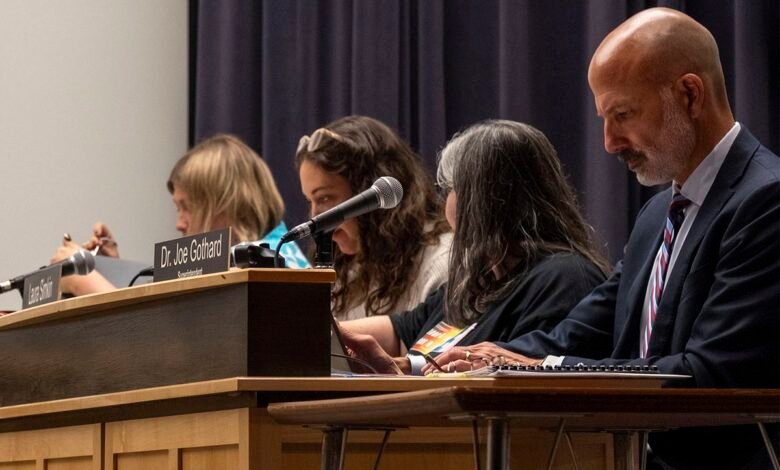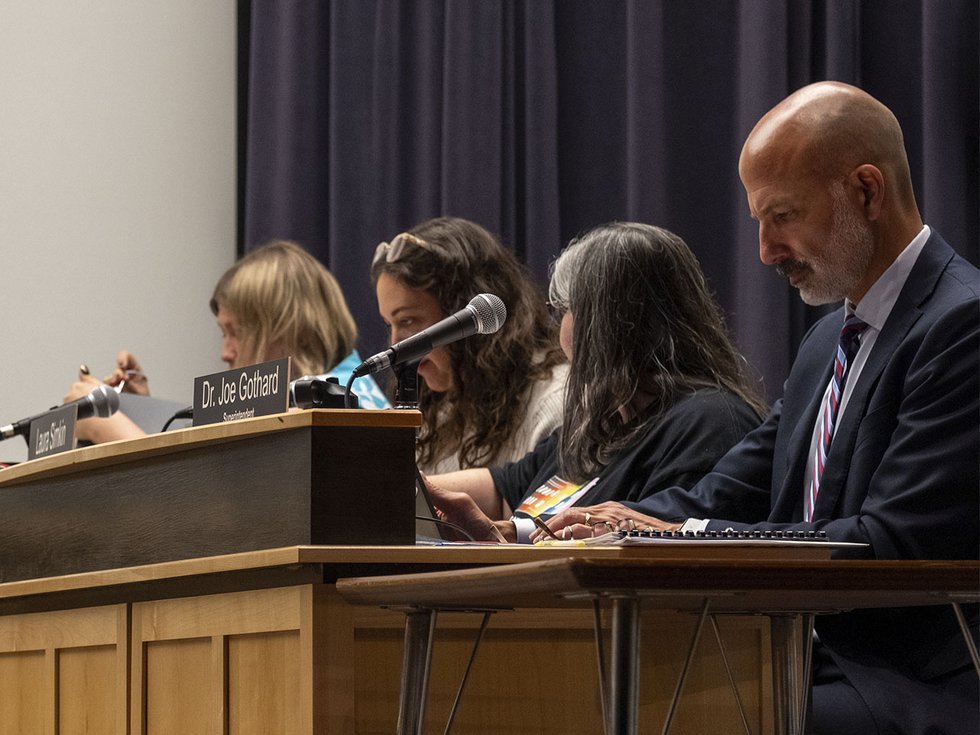Funding requests for Madison school district will be on November ballot – Isthmus


Now it’s up to the voters.
The Madison school board unanimously approved two referendums Monday night that, if given the green light in November, would together add roughly $1,376 to residents’ property tax bills by 2028.
One referendum asks for $100 million for the school district’s growing operating costs, while the other asks for $507 million to repair aging buildings.
“Some realities: state funding formulas for Wisconsin schools have created large funding issues for school districts in Wisconsin, including Madison. Revenue limits have not kept up with inflation in the last 12 years,” district superintendent Joe Gothard told the board prior to its discussion on the referendums. He said the board “must build for our future.”
It was the first board meeting for Gothard since he became superintendent, and he tells Isthmus he was pleased with the outcome of the referendum votes. “It feels good knowing that we were able to come to the meeting tonight and have the information presented in a way that I hope shows our community confidence.”
Gothard added that the operating referendum would cover expenditures for basic needs of the school, like paying teachers and making sure buses run on time, and that the capital budget would help the school “modernize” out-of-date facilities.
Both referendum measures passed the board quickly — discussion on the items lasted less than 45 minutes. There was little public comment before as well — fewer than five people spoke to the issue.
Karen Strickon, a school occupational therapist, told the board she was concerned about the district’s gaps between salaries for existing employees and new hires: “I want to support the referendum, I want to tell other people to support the referendum, but I feel like there is no transparency in how we use our taxpayer money. It seems arbitrary in terms of whose compression salary has been adjusted and whose hasn’t.”
During board debate, Maia Pearson, vice president of the board, asked what would be needed to assure the public that the district was committed to addressing pay issues. Gothard said that accurate information from the district’s financial analysts on the impacts would be needed, and that if the referendums are successful in November, the board has a better opportunity to make such “strategic decisions.”
The last time the school district went to referendum was in 2020, when voters overwhelmingly approved $350 million in funding through two measures — 79.6% of voters approved $317 million for capital project funding, and 76.4% approved $33 million for operating costs.
School district administrators say the district faces a deficit due to declining state funding and the loss of one-time federal COVID-19 relief funds. The state Legislature sets per-pupil revenue limits on the property taxes school board administrators can levy in a given year. If the school board wishes to exceed revenue limits, it must receive voters’ approval through a referendum — Gothard tells Isthmus that there has been “frustration” on the behalf of school districts toward the Legislature’s per-pupil limits.
The operating referendum would fill gaps in the school district’s funding for employee pay and benefits, which makes up nearly 80% of the district’s operating costs, according to a report the nonpartisan research group Wisconsin Policy Forum released on Friday. The school district used federal pandemic funding this year to pay for 111 permanent teaching positions and, in its current budget, looks to add 107 positions to decrease kindergarten and first-grade class sizes. An operating budget referendum would assist the district in paying for those positions, alongside unfunded portions of staff pay raises and increased health care costs.
Capital funding would largely be used at five aging middle schools — Blackhawk, Cherokee Heights, Sherman, Sennett and Toki — through $447 million in funding. Improvements would target such things as updating air conditioning, heating and plumbing systems, adding classroom and library resources, and promoting environmental sustainability.
Board student representative Megan Finando asked Bob Soldner, assistant superintendent of finance, whether the referendum would keep the school district on pace to meet its zero-emission commitment for 2045; Soldner said the investment would “keep track” with that timeline.
District facilities are more than 60 years old on average, the Wisconsin Policy Forum report notes, but reconstruction projects “will not be cheap.”
“If approved and fully phased in, the 2024 [capital] referendum could add up to $327 per year to the property tax bill on the average Madison home starting on December 2025 bills,” the Wisconsin Policy Forum report reads. While costs for the capital referendum will remain nearly the same on property tax bills annually until debt on the buildings is paid off, the tab for the operating referendum would increase incrementally from 2025-28.
The referendums come as the city of Madison debates whether to approve a referendum for the November ballot to confront its own $22 million budget deficit — if approved, voters in the school district and city’s overlap would see three budget referendums on their ballots in the fall.
If voters don’t approve the referendums, the school district would have to dip “heavily” into its estimated $70-$85 million budget reserve to cover costs related to positions and operations, says Jason Stein, research director at the Wisconsin Policy Forum. The school district has already drafted a budget proposal that, if the referendums fail, calls for drawing $39 million from district reserves to cover the budget deficit.
If the referendums do not pass, the school district would face its first decrease in operating revenue in over a decade.
Stein tells Isthmus that the school district might be hesitant to draw from its reserves because those funds would then not be available in the case of an unforeseen situation, like another pandemic. “The reserves help to avoid that.”
Stein notes that the middle schools targeted for capital improvements have some of the district’s lowest ‘utilization rates’ — a building’s actual enrollment divided by its student capacity — in the district. In other words, declining enrollment. Four of the middle school buildings have utilization rates under 60%: the district typically targets a 90% utilization rate for school buildings.
“That’s something that we are highlighting, something for voters in the school board to consider,” Stein says. “As you rebuild a school, then you’re making an investment to use that facility for decades, right? One thing that we’re offering up to be part of the discussion is [whether] the community is confident that all of these locations are going to be used for years or even decades to come.”
Stein stresses that the Wisconsin Policy Forum is not advocating for or against the referendums. He notes that Madison has “good long term growth potential” and that there are numerous reasons that school board administrators might want to keep those buildings, including accommodating future growth.
The state Legislature has kept “relatively tight” limits on property tax increases since 2011 — the same year former Gov. Scott Walker set hard limits on local property tax limits — says Stein. With budgets getting tighter and inflation rising, more municipalities and school districts are likely to go to referendum, he says.
Legislative Republicans in 2009 separated per-pupil funding from inflationary increases and in 2021 declined to increase per-pupil funding, citing an influx of federal funding during the pandemic. Though last year’s state budget provided a $325 per-pupil increase — once in 2023, and another time in 2024 — that number is still about $75 dollars less per-pupil than school districts would need to keep up with inflation.
Voters in the school district have a historically solid record of passing referendums. Of the 16 referendums put forth since 1995 — the first coming two years after revenue caps were introduced in 1993 — eight have targeted capital projects and eight operating costs. Only one operating referendum and two capital referendums have failed.
If the city of Madison also approves an operating referendum for the November ballot, some voters might have three referendums altogether. But Stein, noting Madison’s relative affluence and its long history of approving school board referendums by wide margins, says that’s not necessarily a negative indicator for any of the proposals.
A city referendum would still be a first for Madison.
“There isn’t a track record as far as the city referendum goes, because a city operating referendum has never come up before,” Stein says. Across Wisconsin, Stein says, school referendums have passed in greater numbers and at greater rates than operating budget referendums for cities or counties. Still, he notes that certain voters in the city of Middleton in 2022 saw both school district and city operating referendums on their ballots, both of which they voted through.
Ultimately, Stein says, voters will consider the costs and benefits of the proposals: “Voters are always weighing what their values are and what they hope to fund within the city against what they feel their ability to pay is.”
